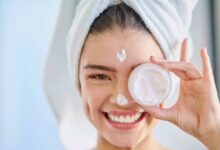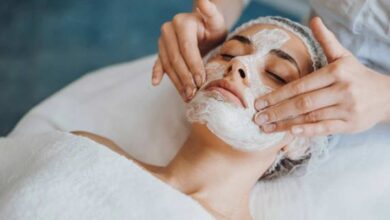Many of us have a routine for our skin that includes a morning and an evening routine involving serums, creams, scrubs, and other facial products. Sometimes, we also do monthly or weekly more advanced facial or skin treatments to give our skin a little more nourishment and exfoliation.
Many people don’t realize that you should change your skincare routine throughout the year, especially if it is a place with frequent climate changes in temperature, humidity, and overall weather, such as New York.
The climate and weather can be very different in New York when you compare the summer months to the winter months. The summer in New York is hot and humid. The winter climate is very different and has extremely cold temperatures and dryness, as well as a lack of humidity.
Heating units indoors also produce dry heat, making it even more dry in the winter. What does this mean for your skin, then? This means that your skin will dry out faster in winter, instead of feeling moist and sweaty.
The winter is also a great time to switch to skin care products and treatments that require you to stay out of the sun. If you live in an area that experiences seasonal changes in weather and climate, here are some changes that you can make to your skincare routine.
1. Use Different Moisturizers
To avoid excessive heaviness on the skin in hot and humid environments, it is best to use a lighter and softer moisturizing cream. This is particularly important if you have oily skin or have a tendency to break out, especially during those humid summer months. You should also use a moisturizer for both the morning and the entire day that protects your skin from the sun. To protect your skin from the sun, your moisturizer should preferably contain at least 30 SPF sun protection. Sun damage can dry your skin and lead to premature aging.
This includes wrinkle formation, thinning of the skin, sun spots, and uneven pigmentation. However, this does not mean that you shouldn’t be protecting your skin from the sun in the winter.
Even though you may spend less time outdoors, the sun is still there and your skin isn’t any less sensitive to it just because it is colder outside. It is best to use a moisturizer that has SPF sun protection all year since the sun shines even in winter. You may spend less time outdoors in the winter than you do in the summer.
The winter air is generally dryer indoors and outdoors, due to heating units drying the air and a general decrease in temperature, causing little to no humidity in the air. This naturally affects our skin and we must be careful to not let it dry out from the drying air.
You should apply a thicker moisturizer throughout the day to keep your skin hydrated. To avoid any dryness, you might also want to bring a moisturizer along with you to your daily activities and routine. You should always take SPF sun protection with you, so make sure you have moisturizer on you.
2. Vitamins and Infusions
Most people spend more time outside in the summer. You will be more exposed to pollution and environmental stress by spending more time outdoors, which can make your skin more vulnerable to the damage caused by the elements.
You should use a vitamin C-enriched antioxidant to prevent damage from outside forces and to keep your skin strong and healthy during those intense summer months. Strong antioxidants will protect your skin from environmental stressors and pollution, particularly for people who live in big cities.
Winter is when we are less exposed to the sun and thus exposed to less Vitamin D. Vitamin D can help keep your skin healthy, so be sure to take vitamin D supplements during the Winter months to make sure you aren’t losing any important nutrients.
3. Additional Products
It is especially important to apply sunscreen during the summer, especially if you and your friends or your family spend a lot of time outside. You may also want to carry chapstick and lip balm with you in the winter.
Winter months can be extremely dry for our lips and skin, meaning that you should provide extra care for the more sensitive areas, such as our lips. This is due to both the drying outside temperatures and the drying indoors caused by heaters.
A good way to avoid chapped lips is to keep your lips moisturized using chapstick or lip balm. For extra protection, you can also use chapstick or lip balm containing SPF to avoid any sun damage or thinning of the skin on your lips.
4. Facials and medical-grade skin treatments
There are different facials for different seasons, so it doesn’t matter if you want regular spa facials or advanced medical-grade procedures offered at your local medical spa like this one located on the Upper East Side in NYC.
You should avoid more invasive and harsh treatments in the summer as you will be spending time outside, making it more difficult to recover from the treatment. Facials at a regular spa can reduce oiliness, clear pores, and inject vitamin C into your skin, which is great for those summer months.
Winter is a time when you have more time indoors and can opt for more advanced facials like Fraxel or Secret RF. These treatments can be done in the summer but you should avoid heat as it can prolong the side effects and downtime.
Fraxel requires that you stay out of the sun for at least two weeks before and during treatment. This can be challenging in summer, so most people opt to have these treatments in the winter. This article provides extensive information about non-ablative laser skin treatments such as Fraxel Dual.
The above-mentioned treatments tend to be more complex and should only be performed by licensed and trained medical professionals. However, they will make a huge difference to your skin when done correctly.
5. Exfoliation
You should exfoliate your skin every day. It will make it easier to absorb any moisturizers or serums that you use. Winter is a great time to use exfoliating treatments and scrubs. Your skin is more dry in winter so the exfoliation will remove any dead and damaged skin. You will be able to absorb your moisturizers more effectively and have glowing, smooth skin.
Conclusion
By adapting your skincare routine to the seasons, you can keep your skin healthy, hydrated, and glowing year-round. From using the right moisturizers and vitamins to incorporating exfoliation and seasonal facials, these adjustments make a noticeable difference in your skin’s appearance and resilience.
If you’re a medical spa owner, offering tailored treatments that align with seasonal skincare needs is a powerful way to Grow Your Medical Spa. Highlighting your expertise in advanced procedures and emphasizing personalized care for your clients will not only build trust but also set your spa apart as the go-to destination for premium skincare solutions.
Start creating customized offerings today to attract more clients and help them achieve their best skin, no matter the season!








